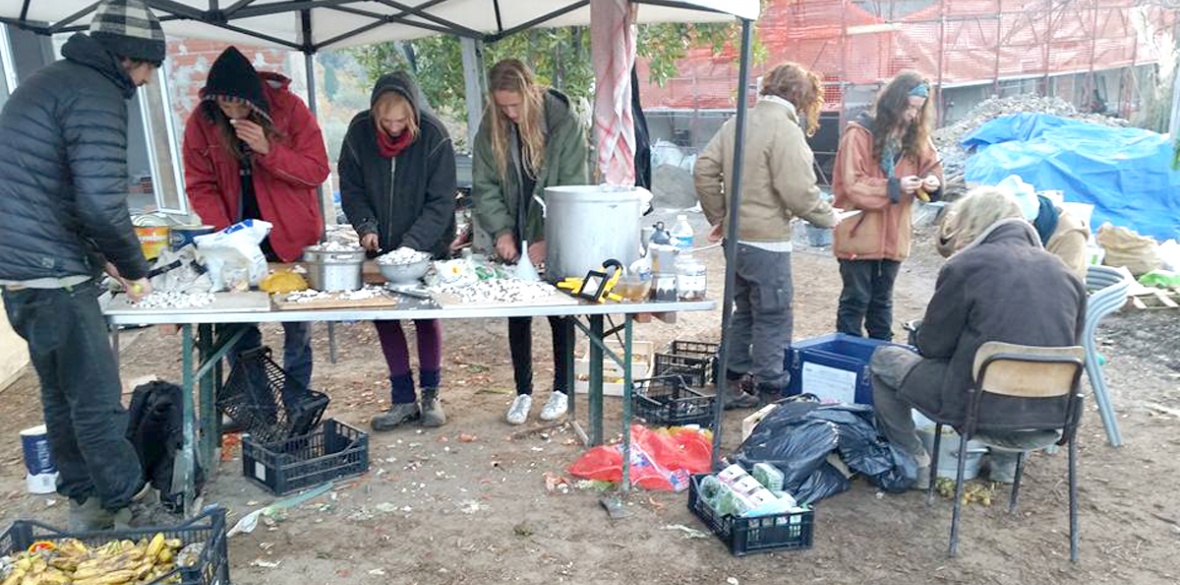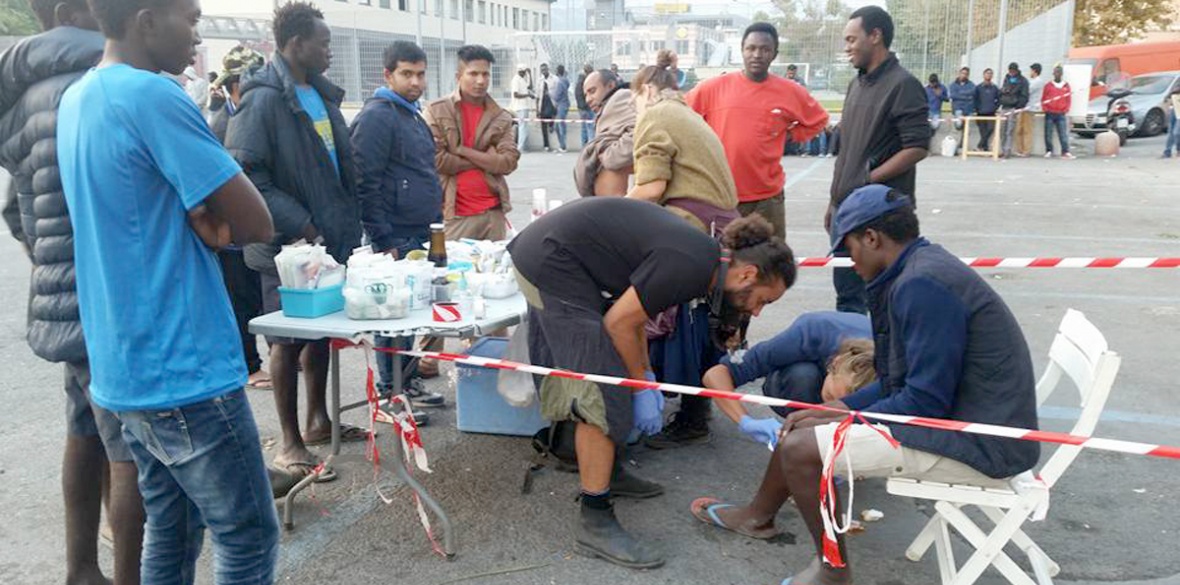This is the last article you can read this month
You can read more article this month
You can read more articles this month
Sorry your limit is up for this month
Reset on:
Please help support the Morning Star by subscribing here
THE French authorities desperately fear the re-establishment of another Jungle. They fear it so much that military police are ordered to patrol the fields where the sprawling Calais camp once stood and tear gas refugees in their sleep.
They slash tents, steal belongings and disrupt volunteers giving aid, preventing refugees settling for even a few days in the same place.
Over in Italy, the same methods of intimidation are used as France presses its neighbour to stop refugees crossing the border.
Just four miles from France, around 200 refugees are stuck in the Italian town of Ventimiglia. They sleep rough under a bridge next to the River Roya in unsanitary conditions, waiting for days, weeks or even months for the right moment to make the perilous journey over the mountains into France where many fall to their deaths.
The “pass of death” is now the only way refugees can make the crossing after France declared a state of emergency in 2015 and closed its border with Italy.
Since then, Ventimiglia, also known as “mini-Calais,” has become another place of limbo for refugees and one of the most desperate places along the trail to northern Europe.
Over the summer, the number of refugees in Ventimiglia was far higher with 700 people living in and around the town.
Apart from a Red Cross camp, where many refugees are unwilling to go because entry requires them to give their fingerprints, the town has no facilities to support refugees and actively disrupts organisations trying to help them.
A local church that had been housing refugee women and children was closed down by the Italian authorities earlier this year. No-one has heard from these families since. And around the same time, the authorities carried out a number of raids near the bridge, clearing shelters, vegetation and a tap providing running water in an attempt to discourage people setting up camp there.
“There used to be lots of bushes and trees in which people would camp out, but those were all bulldozed and tents were taken away and they made a large stretch unliveable,” Marta Welander, a refugee rights activist, tells me.
“It’s constantly this idea of moving people from where they are trying to set up shelter or from where they are trying to set up some sort of sanctuary.”
Welander collects data on the refugee crisis in Europe with the organisation she founded — Refugee Rights Data Project (RRDP).
She visited Ventimiglia during the summer, saying it was one of the most difficult places she’s researched — which is saying something considering RRDP has produced reports from squalid camps in Calais, Dunkirk and Greece.
“Ventimiglia was a horrendous place because you had people who had just arrived from Libya and many of them recounted stories of abuse and torture or witnessing others who had been tortured or shot dead so all of these experiences were completely fresh,” she tells me.
According to the RRDP report 80 per cent of refugees in Ventimiglia are from Sudan and have travelled through Libya just days before reaching the Italian town. Welander tells me that many of the refugees she spoke to were highly traumatised and still had open wounds from the abuse they suffered in the lawless north African country.
The RRDP team spoke to a man who witnessed a baby being shot by Libyans while in its mother’s arms. And a 24-year-old man from Chad said he suffered from back and internal problems after he was beaten on the spine with a Kalashnikov in a Libyan camp.
Welander stressed that the prevalence of mental health issues among refugees in Ventimiglia makes it even more important for the European authorities to set up adequate services to support them. But instead they use force and intimidation tactics to make the city as inhospitable as possible.
Volunteers are also on the tail end of police intimidation. In fact the police seem to be on a mission to incriminate volunteer groups in an attempt to disrupt their aid efforts.
Kesha Niya is one of just a few organisations giving out meals and supplies to refugees in the area, and as a result has had a lot of problems with the police.
Marcel Horstmann, who has been volunteering in Ventimiglia since April, was arrested last month while distributing food. He was accused of being a “danger to the public peace” and banned from Ventimiglia for three years. Horstmann claims that the police had no grounds to arrest him and tried to force him to sign a document written in Italian which he doesn’t speak. Although the police have always kept tabs on volunteers, he says that the situation has got worse over the past few months.
“They are always there and always trying to treat us like idiots,” he says. “But what’s worse now is that they are trying to react with anything that they can find. The lawyer saw the papers and he saw my case and he said it was ridiculous, like there was no translation at all. Everything was in Italian.”
Volunteers from other organisations in the area are also disrupted for arbitrary reasons by police. Sara Hamssaoui from Progetto20k, an Italian group that provides legal information, told me that “many times they [the police] try to find the objects or excuses to use against us.
“One morning the police went to the ‘free spot,’ a meeting point for activists, which has now been closed by police, found knives we used for cooking, and tried to use these tools against us by saying we owned illegal weapons,” she said.
Hamssaoui described Ventimiglia as a “militarised city,” that’s “covered in police cars.” Refugees are often arrested, she says, and forced to sign documents they don’t understand without any translation.
What makes matters worse is that the authorities constantly round up refugees and deport them back to the south of Italy where they had their fingerprints taken.
These deportations can be violent. Hamssaoui tells me that young refugees are woken up at the train station in Ventimiglia “with kicks” by police before they are sent to the city of Taranto. The forced removals are futile because they don’t deter refugees returning as soon as they can. Once a man, woman or child has trekked across the Sahara, been detained and abused in Libya and survived the Mediterranean crossing, nothing will stop them from reaching the place where they want to start a new life — and nor should it.
“It becomes a very strange process of push backs and people being determined to make their way back. It’s nonsensical and exhausting for all parties involved,” Welander says.
The situation in Ventimiglia is desperate. Without adequate services available, refugees are struggling with open wounds, dermatological conditions and the traumas of their journeys. “We need a professional team of doctors,” Hostmann tells me. “We are searching but at the moment but no-one is really interested.”
“Mini-Calais” is an apt name for Ventimiglia. In both places you see a severe lack of facilities and the same strategies of exhaustion and harassment used to prevent refugees from settling in one place.
It’s a depressing thought that those refugees currently sleeping under the bridge in Ventimiglia will experience the same if not worse treatment all over again in northern France.
As Welander says, “it’s very difficult to find sanctuary in Europe these days.”

 Bethany Rielly
Bethany Rielly










